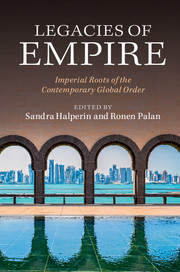Book contents
- Frontmatter
- Contents
- List of figures
- List of tables
- List of contributors
- Acknowledgments
- 1 Introduction: legacies of empire
- Part I Incomplete transitions from empires to nation states
- Part II Legacies of non-European empires in today's world
- Part III The future legacies of the American Empire
- 8 Foreign bases, sovereignty and nation building after empire: the United States in comparative perspective
- 9 Empire, capital and a legacy of endogenous multiculturalism
- 10 The assemblage of American imperium: hybrid power, world war and world government(ality) in the twenty-first century
- 11 Conclusions
- Index
- References
10 - The assemblage of American imperium: hybrid power, world war and world government(ality) in the twenty-first century
from Part III - The future legacies of the American Empire
Published online by Cambridge University Press: 05 August 2015
- Frontmatter
- Contents
- List of figures
- List of tables
- List of contributors
- Acknowledgments
- 1 Introduction: legacies of empire
- Part I Incomplete transitions from empires to nation states
- Part II Legacies of non-European empires in today's world
- Part III The future legacies of the American Empire
- 8 Foreign bases, sovereignty and nation building after empire: the United States in comparative perspective
- 9 Empire, capital and a legacy of endogenous multiculturalism
- 10 The assemblage of American imperium: hybrid power, world war and world government(ality) in the twenty-first century
- 11 Conclusions
- Index
- References
Summary
[T]he nature of war consisteth not in actual fighting, but in the known disposition thereto during all the time there is no assurance to the contrary.
Thomas Hobbes, Leviathan, ch. 13
Laissez-faire was planned; planning was not.
Polanyi 2001, 147
Introduction
What might be the legacies of American imperium, now said to be in serious decline and, if some pundits are to be believed, soon to be flung into the dustbin of history? How will these legacies mark the world(s) to come and how long might they last? Will they resemble those left behind by previous empires, in the form of infrastructures, practices, borders, legal systems and class systems? Or will their mark come through the Anglo-American capitalism that has permeated every nook and cranny of twenty-first century life? As Sandra Halperin and Ronen Palan have suggested in their introduction to this volume, empires in the dustbin do not simply go away, even when their capitals and armies vanish, leaving behind only ruins and recollections. In their dimly-remembered glory, empires are endlessly recreated in all sorts of places and forms, if only in the hope that some of that glory might rub off on their successors.
In this chapter, I argue that the primary legacy of American empire to those future world(s) is an ‘assemblage of imperium’. An ‘assemblage’ is an arrangement constituted by a ‘multiplicity of heterogeneous objects, whose unity comes solely from the fact that these items function together, that they “work” together as a functional entity’ (Haggerty and Ericson 2000: 608, citing Patton 1994: 158).
- Type
- Chapter
- Information
- Legacies of EmpireImperial Roots of the Contemporary Global Order, pp. 221 - 242Publisher: Cambridge University PressPrint publication year: 2015



